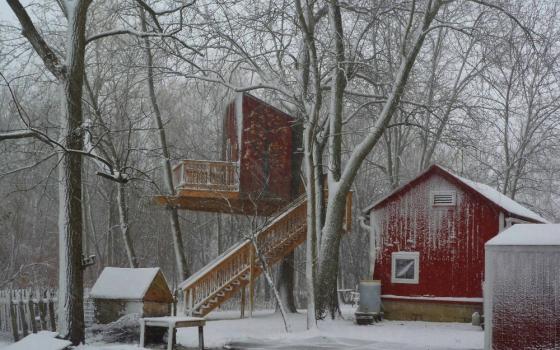Winter is fast approaching in Wisconsin. The chickens go in to roost by 4 p.m. The flocks of Canadian geese have ceased their noisy flights overhead, and the trees are nearly bare. We had our first snowfall this week.
This year, I feel more attuned to these changes than ever before. This is due in large part to the fact that I am living on a farm for the first time in my life. However, I think it's also because the wintery themes of darkness and stripping away are especially poignant right now as the turmoil of our world has seemed so accentuated in the past few weeks.
I hardly know where to look or what buzzwords (refugees, racism, xenophobia, terrorism, poverty, climate change . . .) upon which to focus. It can be overwhelming. I oscillate between sadness, anger and defiant flickers of hope.
It's no surprise then, that my ears perked up when I heard the following lyrics in a hymn at Mass last Sunday, "Each Winter as the Year Grows Older" by William and Annabeth Gay:
Each winter as the year grows older,
We each grow older, too.
The chill sets in a little colder;
The verities we knew
Seem shaken and untrue.When race and class cry out for treason,
When sirens call for war,
They overshout the voice of reason
And scream 'til we ignore
All we held dear before.
Yes! I wanted to shout . . . or cry. That's it! Fear can turn us into people we don't want to be. Like many, I sometimes don’t know how to respond.
For those of us in the U.S., this week offers one opportunity: an invitation to be grateful. Setting aside the sad irony of Thanksgiving's origins in light of current public debate, it seems to me that a holiday dedicated to gratitude is a good place to start. Gratitude changes things.
For one thing, gratitude can call us back to our values. When we gather this week, do we give thanks for material goods, privilege, or power? Generally, no. We give thanks for opportunities received, love shown, relationships grown. We may give thanks for material "enoughness," but probably not for excess. This tells us something.
During my time as a Jesuit Volunteer, I often spoke with North Americans who came to Belize on immersion trips. In nearly every group, someone would voice the expectation that after witnessing such material poverty, they'd return home more grateful for what they have. I can identify with the sentiment; I've felt it, too.
But what does it mean to be "grateful" for "what I have?" If "grateful" is just a nice word, and "what I have" is defined only in material terms, then I'm rejecting a call to conversion and the idea that people living in material poverty may have a thing or two to teach me. I may be tempted to become less, not more, generous.
In the deepest parts of me, I know that true gratitude is evidenced in the way I choose to live, and that "what I have" is everything but material excess. It is material enoughness. It is community and family. It is access to education. It is a childhood untainted by violence and war. It is spiritual support and relational abundance. It is the joy of my vocation. Above all, it is the knowledge of God's love and presence.
Gratitude can also remind us that no matter how much we'd like to believe otherwise, we are all vulnerable, needy, and dependent upon one another. The very act of giving thanks acknowledges that the good things in our lives are not simply the result of our own striving. At worst, giving thanks can remind us that not one of us is entirely independent; at best, it can nurture our humility and expand our compassion. If fear has the power to fling us into a mentality of scarcity, then practicing true gratitude can help us shift to a mentality of abundance. Couldn't we all benefit from this?
This Thanksgiving, can we dare to give thanks for all good things, not just our good things? Will we remember that we belong to one another? Will we acknowledge that the pain of those across the world is as much our pain as it is theirs?
In its own simple way, life "on the farm" has much to teach me about gratitude, abundance, and compassion. As our days here shorten, I'm reminded that others are enjoying the lengthening days of spring. The trees are stripped bare, but within the branches next spring’s buds have already formed and are patiently awaiting their time to bloom. And the carrots that got buried beneath the snow before we could harvest them will only grow sweeter with the chill.
So I will dare to believe, as that timely hymn goes on to say:
Even as the sun is turning
To journey to the north,
The living flame, in secret burning,
Can kindle on the Earth
And bring God’s love to birth.
[Christin Tomy is a novice with the Dominican Sisters of Sinsinawa, Wisconsin. She has lived and worked in Central and South America and has a background in Spanish and social work. She is passionate about social justice, good hugs, Iowa and most outdoor activities. She also writes for her community’s blog at catherinescafe.blogspot.com.]


